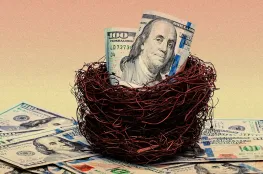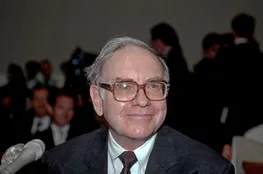Roughly 30 years ago, the proliferation of the internet began changing Wall Street forever. While institutional investors had relied on internet-based trading for years, the ability for everyday investors to access online trading platforms, as well as find pertinent news and financial information with the click of a button, was revolutionary. Although institutional investing still accounts for the majority of average daily trading volume on Wall Street (primarily due to high-frequency trading programs), retail investors have played an increasingly larger role over time.
Based on data from "The Retail Investor Report," compiled by five authors, retail investors accounted for 25% of total equities trading volume in 2021, which nearly doubled from where things stood a decade earlier. Online brokerages have taken note of this trend and done what they can to cater to everyday investors. Robinhood has been among the most successful at signing up the retail crowd, with investors flocking to the company for its commission-free trades and ability to buy fractional shares. But what makes Robinhood’s platform especially unique is its "100 Most Popular" tool, which allows anyone to see which stocks and exchange-traded funds (ETFs) are held most frequently within customers’ portfolios. It just so happens that the most widely held ETF on Robinhood, the Vanguard S&P 500 ETF ( VOO 0.52% ) -- which has rallied 632%, including dividends paid, since its inception nearly 15 years ago -- is the only general investment that billionaire Warren Buffett has recommended for everyday investors . Billionaire Warren Buffett doesn’t give specific investment advice -- but has made one exception The Oracle of Omaha’s investing prowess at Berkshire Hathaway ( BRK.A -0.22% ) ( BRK.B 0.04% ) has been well documented. Since taking the role as CEO 60 years ago, Warren Buffett has overseen a cumulative return in his company’s Class A shares (BRK.A) of nearly 5,900,000%, which has absolutely crushed the total return, including dividends, of the benchmark S&P 500 ( ^GSPC 0.52% ) . In addition to mirroring Warren Buffett’s buying and selling activity, which can be done by tracking his trades via quarterly filed Form 13Fs, investors aim to emulate his investment traits . This includes buying for the long term and investing in companies with sustainable moats and strong management teams. But if there’s one thing Warren Buffett doesn’t do, it’s offer specific investment advice. While he frequently speaks glowingly about the core stocks Berkshire Hathaway already holds in its investment portfolio, the Oracle of Omaha doesn’t tell retail investors what they should be doing with their money... with one exception . “
On May 2, 2020, shortly after the COVID-19 pandemic broke out and sent Wall Street’s major stock indexes plummeting, Berkshire Hathaway held a virtual annual meeting for shareholders. While Buffett tackled an assortment of topics, he also offered up a direct investment recommendation to retail investors: Being a long-term investor, Buffett is well aware of the disproportionate nature of economic and stock market cycles -- and he’s angled Berkshire Hathaway to take advantage of this nonlinearity. For example, the U.S. economy has endured 12 recessions since the end of World War II in September 1945. The average economic downturn has resolved in just 10 months, with no recession lasting longer than 18 months. In comparison, the average period of economic growth has endured for about five years. Long-winded periods of growth bode well for corporate America. Likewise, bull markets last substantially longer than bear markets . A June 2023 data set published by Bespoke Investment Group on X (formerly Twitter) found the average S&P 500 bear market since the start of the Great Depression lasted 286 calendar days (roughly 9.5 months). Meanwhile, the typical bull market stuck around for 1,011 calendar days, or two years and nine months. Buffett realized a long time ago that being an optimist is a moneymaking decision. “
Robinhood’s retail investors have wisely piled into a time-tested, low-cost ETF that Berkshire Hathaway’s billionaire CEO (in a general sense) believes everyday investors can comfortably own over the long run.”
























